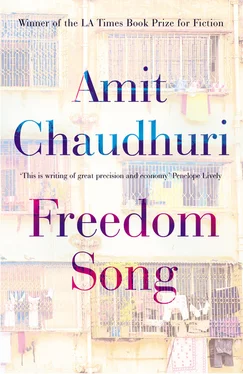This was the journey his father had made for the last twenty-five years, the journey he’d made when Bhaskar and Manik and Piyu were at school, their heads bent separately over books, and their mother at home. Its frequency and purpose had, by now, after all these years, diminished, the trip almost become ordinary, a repeated ritual rather than an ambition. And Bhaskar too had now embarked upon this sketchy but indelible route.
Part of the reason for the aggravation of Bhaskar’s backache, it had to be admitted, was the jolts and bumps of the drive. The Municipal Corporation, it seemed, had no money to repair these roads and would have none in the near future. The interconnected, anonymous roads, adorned at intervals by small tea-shops, one half-defined vista giving way to another, shrank at last and resolved itself into something concrete and real and small, into this factory that had always been there. Its gates presented itself along a lane only wide enough to accommodate one car at a time.
The larger companies around it had left, but it and others like it had remained and made of this place their special habitat. It was Lord Vishwakarma who looked after this company and the cranes that it made and who looked after its neighbours and their small range of products.
And yet of late Bhola and Bhaskar had been discussing in a slightly emotional way the effect liberalization would have on their company. For new times bring new and unforeseen exigencies. ‘It’ll be difficult for us to survive,’ said Bhola with satisfaction. ‘The big ones will go in for collaborations and mergers. And the small ones will be pushed out by multinationals.’ They made gloomy and extreme predictions.
Here South Calcutta receded; homes, children, mothers, servants were replaced by men in dirty overalls wandering about in the workshed. Without explanation, the machines hummed and rattled. In other factories nearby, machines hummed and rattled as well for the purposes of a tiny but persistent line of production.
There was a calendar on the wall of the office’; an old map; near the workshop, a small shrine.
Bhaskar oversaw what everyone else was doing; checked if any fresh orders had come through; dialled several phone numbers for fresh orders.
‘The whole world’s in a recession,’ he said. And indeed it was.
Then he made a few more phone calls.
This company had been founded by a group of friends, some of whom, like Bhola, had given up jobs to pool their resources into the business, others who had been waiting to make a beginning in some sort of enterprise. That was a time when many middle-class people decided to start small businesses. All of Bhola’s partners lived, as it happened, in South Calcutta, not far from each other.
Then the daily journeys began, exultant at first, routine later. As a business grows or fails, the families of its employees and owners live out their separate destinies. Children grow up over a time that seems longer than it will in retrospect; wives age subtly; they seem young and unchanged for a considerable period of time; men visit the factory and the business enters the bloodstream.
Two years after his marriage, Bhola had decided to leave his job and put the money he had received as a gift from his father-in-law into starting this business. His father-in-law himself was an inspiration; a stern man who, through acumen rather than sophistication, had made his enterprise a success; and there was no reason why Bhola and his partners couldn’t do what his father-in-law had done. The father-in-law (dead for thirteen years), whose name had been Radhanath Das — all his products bore the legend ‘Das’—had personally been aghast at Bhola’s decision.
The partners had intended to contribute something to the country: cranes, and other nuts and bolts of the manufacturing industry. For they were civil engineers, not Marwaris and traders; the country needed them; and there would be big money in it and great demand for it; the country needed dams, bridges, roads and pylons as it grew. .
The name they came up with for the factory, Goodforce Literod, was a judicious composite of English words; and Literod became the brand name of a pulley they manufactured.
They produced calendars every year, simple dignified squares with a sheaf of dates attached, and the name Goodforce Literod imprinted upon them, the calendars as much announcing this name as the year they were produced in. Each year, the calendars and that name had their rebirth. It was as if the calendars, whose pages so quickly became ragged, gave the company a legitimacy.
It was during the years of the Naxals that the company went bankrupt. A protracted abeyance began, in which the business brought in nothing, no income, and when it became a symbol of some specific but not easily grasped meaning; it was at this point that the business finally became more than a business, and became a way of life, a definition of the existence of the families that had invested their lives in it. Each morning Bhola’s children saw their father going to work, wearing a shirt, trousers, and shoes, although something in them knew he was not going to work.
Yet the name — Goodforce Literod Ltd. — still possessed its music for the children.
Most of the partners had died over the last fifteen years. The factory remained a husk of its first intentions.
Naturally it did not seem that Manik, Bhola’s younger son, would ever return to Calcutta and have anything to do with the company. Recently he’d written from Germany that he wanted to study management in America once he’d graduated, which was a very wise thing to do.
Yet — unexpectedly — the company had been functioning for the last two years with a tepid body-warmth, something approaching a normal temperature: and no one knew or could explain why. It was as if the dead partners had, from another world, bestowed their hopes and benedictions upon it.
And each year there was the Vishwakarma Puja. And all members and friends of the family who’d been invited would set out in their cars after filling the tanks with forty litres of petrol, towards Howrah. Though the last cook, whose fragrant preparations of goat’s meat and fish-head dal were well known, had died two years ago of cholera, the present cook too had a reputation. For an hour and a half they would travel, to go to the factory in Howrah and eat at the Vishwakarma feast.
But Bhaskar’s joining the factory had been seen by others with bemusement and surprise; for it was not so much an entry into the world of business as an escape from it. Why should a young man, unless he had no serious ambition in life, or no choice, want to join a company that was already a ghost of itself? His parents tried not to have to think about the answer to this question. But for Bhaskar, who, after graduating with a second-class commerce degree, and rather desultorily, for a period, studying Cost Accountancy — for Bhaskar, who, afterwards, had moved restlessly from job to temporary job, it had meant a familiar place to go to; it meant not being swallowed up in the orbit of temporary sales work for large companies; and, most importantly, his pride would not be challenged, for he would not work under anyone except his father and with his father’s old friends. He gave himself, thus, whole-heartedly to securing fresh orders. He went off to meet Marwari traders; he went to Ranchi to confer with representatives of small companies. He tasted the food in various small towns.
When Bhola came back to India from Germany he was only twenty-eight years old; he had no idea then he’d go into business. He had gone on a course of technical training; and he was married within a year of his return, when he was twenty-nine. Bhaskar’s mother was nineteen years old then, barely a woman, and she was still — it was heard — studying for her BA. But her student life ended next year, the first year of her marriage, when she found she had failed her BA because she hadn’t worked hard enough for her English exam; tears flowed down her cheeks. And Bhola patted her lovingly on the back. The English language ever eluded her and then, graciously, came to bother her not at all.
Читать дальше












